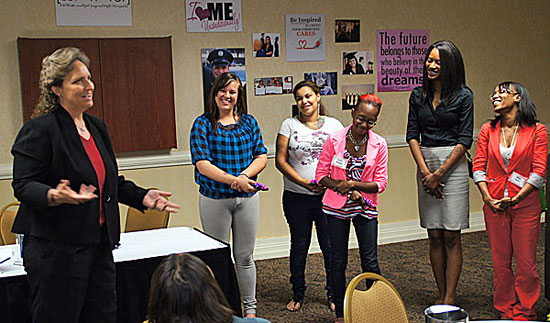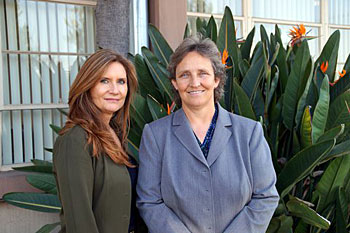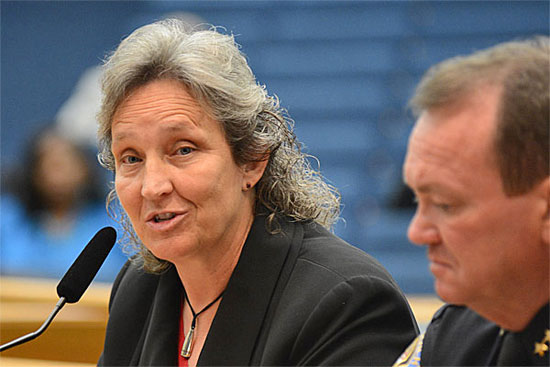On kids’ side against sex traffickers
September 18, 2013
Michelle Guymon understands why people pass by the children on the boulevards, looking but not really seeing youthful lives shrouded in peril and despair.
For years, she did it herself.
“I’ve seen young girls on the side of the road,” said Guymon, who joined the county’s Probation Department in 1989. “There comes a time in your life when you don’t even pay attention to that anymore because you’re on the phone, you’re on your way to work, you’re focused on the street lights…You just drive by stuff.”
She’s not just driving by anymore. Three weeks ago, Guymon was named the first director of the county’s Domestic Minor Sex Trafficking Project. She’s determined to help the system—and the public—see the grim reality of underage girls, some as young as 10 years old, being victimized by the sex trade.
Guymon, 52, said her own awakening was a long time coming. For years, like others in the criminal justice system, she had taken a dim view of those girls by the side of the road.
“I had looked at these young women as teenage prostitutes, and this was just the crime they committed, like this girl over here committed a crime for robbery,” she says. “And I remember having judgments about them, that this was their fault, this was their choice.”
An unexpected assignment to a subcommittee on underage sex trafficking in 2010 shook her world view. At first, she was puzzled by the terminology being used, assuming that “trafficking” was something that just happened to kids from faraway countries.
When she attended the first meeting, she discovered that everything she thought she knew was wrong.
“It wasn’t until that moment when I realized, oh my gosh, you mean these kids are not teenage prostitutes? They’re not out doing this and making lots of money as a career choice?” she said. “They’re being what we’d consider sexually exploited. It was a defining moment for me.”
Instead of being victims of shadowy international sex trafficking rings, young girls here in Los Angeles, she found, are being sold into what some have called sexual slavery by local street gangs and other opportunistic homegrown criminals.
Now those girls had a champion, on the inside.
“She is probably one of the most committed, action-oriented and solution-focused persons that I have worked with in a very long time,” said Fesia Davenport, chief deputy director of the county’s Department of Children and Family Services, which is developing its own plan to attack the problem as part of the countywide effort. “She doesn’t have any egotistical skin in the game. She’s willing to take a good idea from anyone.”
Working with a colleague, Hania Cardenas, Guymon began dedicating herself to the issue—even though both she and Cardenas were also working demanding fulltime jobs within Probation.
In the three years since then, the county, with Probation at the forefront, has emerged as a leader in raising consciousness about underage girls being trafficked. Guymon estimates that her department alone currently has 435 sex trafficking victims under the age of 18 currently under its supervision, with some 3,000 more between the ages of 18 and 24.
Even as officials continue to gather data to get a better handle on the scope of the problem, initiatives—like a special “Girls’ Court” in Compton—have been launched to help surround young victims of sexual exploitation with supportive services and the kinds of human connections needed to break the bonds they’ve developed with their pimps.
Commissioner Catherine J. Pratt of the Girls’ Court said it is essential to have someone in Guymon’s position to keep the momentum going. “There’s a lot of system change that we need to do,” she said. “And she’s a wonderful person for it.”
Guymon’s small team—herself plus “a mighty three” probation officers—are focused on building that kind of trust. “These kids have my probation staff on speed dial, 24 hours a day, seven days a week,” she said.
Monthly training sessions at a hotel in Downey have now reached nearly 3,000 county employees and community activists, with a waiting list stretching through November.
The Board of Supervisors recently unanimously voted to urge the state to increase penalties for men who pay for sex with underage girls—including higher fines and a requirement that they register as sex offenders. Guymon testified in favor of the action, along with officials including District Attorney Jackie Lacey and Long Beach Police Chief Jim McDonnell, who said that local gangs’ involvement in sex trafficking is similar to their incursion into the narcotics trade in the late ‘70s and early ‘80s.
Ultimately, Guymon believes the state should decriminalize prostitution for girls under 18 years of age. But she acknowledges there’s a long way to go before the system is ready to deal with all the “unintended consequences” that might result.
In the meantime, she and a cross-departmental team are pushing forward to develop new protocols and practices to attack the problem.
“Once you know better, you have to do better,” she said. “You’ve gotta do something. You can’t ignore it. Our kids are counting on us.”
Probation Chief Jerry Powers said he named Guymon to her new post because the scope of her work on the problem had “mushroomed.”
“Even having been in the profession as long as I’ve been it, I would have never guessed it was as significant as it’s turned out to be,” Powers said. “Michelle’s work has helped us understand the complexity of the issue and the magnitude of it.”
“I think she’s awesome,” added Cardenas, her probation colleague and partner in the effort. “We always laugh about how we complement each other so well. She’s so outspoken. She likes to present. I’m a better writer. She kind of ended up being the face of it, which is her strength.”
The oldest of seven children, Guymon grew up in St. George, Utah, aspiring to play college basketball and ultimately to become a women’s basketball coach at the university level.
She went on to compete in college but found another, more satisfying, court to play on when she accepted an invitation to become the recreation director at a boys’ group home. Eventually, that work led her to a job with the Los Angeles County Probation Department. Looking back now, Guymon, who has a bachelor’s degree and master’s of social work from Cal State San Bernardino, knows she made the right move.
“Life threw me a curveball and I was just hooked,” she said. “I really am a kid junkie on some level. I feel like it’s where I’m supposed to be.”
Posted 9/18/13















 405 bridge work causes a stink
405 bridge work causes a stink
